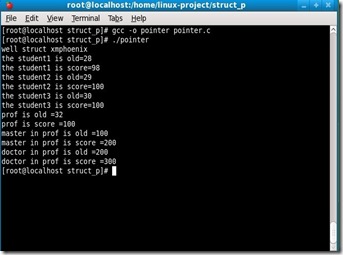在我们的驱动开发中经常用到结构体,下面将结构体的基本用法总结如下:
#include<stdio.h>
#include<stdlib.h>
#define Debug
struct student{
int old;
int score;
};
typedef struct master{
int old;
int score;
}ma;
typedef struct doctor{
int old;
int score;
}dor,*doctor;
typedef struct professor{
int old;
int score;
struct master *ma_p;
doctor doc_p;
}prof,*professor_p;
int main()
{
struct student stu;
stu.old=28;
stu.score=98;
printf("well struct xmphoenix\n");
#ifdef Debug
printf("the student1 is old=%d\n",stu.old);
printf("the student1 is score=%d\n",stu.score);
#endif
ma master;
ma *p;
master.old=29;
master.score=100;
p=&master;
printf("the student2 is old=%d\n",p->old);
printf("the student2 is score=%d\n",p->score);
p=NULL;
doctor pt;
pt=(doctor)malloc(sizeof(dor));
pt->old=30;
pt->score=100;
printf("the student3 is old=%d\n",pt->old);
printf("the student3 is score=%d\n",pt->score);
free(pt);
professor_p ppt;
ppt=(professor_p)malloc(sizeof(prof));
ppt->old=32;
ppt->score=100;
ppt->ma_p=&master;
ppt->ma_p->old=100;
ppt->ma_p->score=200;
ppt->doc_p=(doctor)malloc(sizeof(dor));
ppt->doc_p->old=200;
ppt->doc_p->score=300;
printf("prof is old =%d\n",ppt->old);
printf("prof is score =%d\n",ppt->score);
printf("master in prof is old =%d\n",ppt->ma_p->old);
printf("master in prof is score =%d\n",ppt->ma_p->score);
printf("doctor in prof is old =%d\n",ppt->doc_p->old);
printf("doctor in prof is score =%d\n",ppt->doc_p->score);
free(ppt->doc_p);
free(ppt);
return 0;
}
编译运行结果:




 浙公网安备 33010602011771号
浙公网安备 33010602011771号